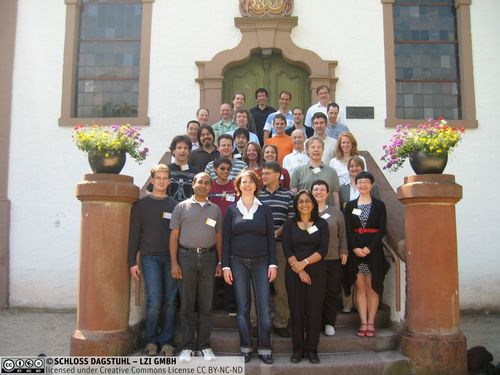Dagstuhl Seminar 08251
Contextual and Social Media Understanding and Usage
( Jun 15 – Jun 20, 2008 )
Permalink
Organizers
- Susanne Boll (Universität Oldenburg, DE)
- Mohan S. Kankanhalli (National University of Singapore, SG)
- Gopal Pingali (IBM TJ Watson Research Center - Hawthorne, US)
- Svetha Venkatesh (Curtin Univ. of Tech. - Perth, AU)
Contact
- Annette Beyer (for administrative matters)
Many years of multimedia research has achieved interesting results in the field of the semantic understanding of media content. Signal analysis, i.e., video, audio, image analysis has achieved some initial results to (semi-)automatically understand the semantics. However, the ability to really understand the media e.g. tell a sundown from a sunflower in an image is still difficult. It is becoming clear that “one way to resolve the semantic gap comes from sources outside of the image by integrating other sources of information” and that we should “exploit the synergy between the various media, including text and context information”. Flickr brought a new approach of communities, sharing, and tagging of photos. While tagging does not really solve the problem, it brings a new perspective of the situational usage of media, the co-presences of things and persons. Perhaps context and socio-sphere of media will bring us closer to surmounting the semantic gap. Indeed, we are now at the threshold of a new decade of contextual and social understanding of media content.
In this seminar, we aimed to see how content, context, and social community are influencing media understanding. Where do we find the sources to understand media and how does this affect and drive our methods? We examined the potentials and challenges, research directions, and looked into to different application domains ranging from personal media and news to biomedicine, and robotics. The seminar brought the research community (from academia, labs and industry) together to help make progress towards the vision that “capturing, storing, finding, and using digital media should be an everyday occurrence in our computing environment.” We had stimulating discussions on the role of context and social aspects for tomorrow’s multimedia content understanding and media usage.
The Structure of the Seminar
This seminar was structured to examine the understanding of images, video, and audio using a rich array of contextual information - social, spatial, and temporal. After the first two days of presentations of position statements by the individual participants, there was an open brainstorming session organized to find the significant issues to be discussed.
The Outcomes of the Seminar
The following issues, plans and action items emerged at the end of the workshop:
- Establishment of a common repository for multimedia data and benchmarking
- Organization of workshops
- Along the lines of social media, and aim at a short term collaboration on an initial short paper on the ideas.
- Organization of workshop in modeling and context, with emphasis on context driven information recovery and discovery.
- Challenges and issues in user experience
- Brett Adams (Perth, AU)
- Susanne Boll (Universität Oldenburg, DE) [dblp]
- Cheng Cai (Universität Oldenburg, DE)
- Pablo Cesar (CWI - Amsterdam, NL) [dblp]
- Trevor Darrell (University of California - Berkeley, US) [dblp]
- Daniel Gatica-Perez (IDIAP Research Institute - Martigny, CH)
- Andreas Girgensohn (FX Palo Alto Laboratory, US)
- Alan Hanjalic (TU Delft, NL)
- Lynda Hardman (CWI - Amsterdam, NL) [dblp]
- Peter Hart (Ricoh Innovations - Menlo Park, US)
- Alexander G. Hauptmann (Carnegie Mellon University, US) [dblp]
- Andreas Henrich (Universität Bamberg, DE) [dblp]
- Masashi Inoue (National Institute of Informatics - Tokyo, JP)
- Alejandro Jaimes Larrarte (Telefónica Research, Madrid, ES)
- Gareth Jones (Dublin City University, IE) [dblp]
- Mohan S. Kankanhalli (National University of Singapore, SG) [dblp]
- Aisling Kelliher (Arizona State University - Tempe, US)
- Andruid Kerne (Texas A&M University, Interface Ecology Lab, US)
- Rainer Lienhart (Universität Augsburg, DE)
- Stéphane Marchand-Maillet (University of Geneva, CH)
- Frank Nack (University of Amsterdam, NL) [dblp]
- Klara Nahrstedt (University of Illinois - Urbana-Champaign, US) [dblp]
- Daniela Nicklas (Universität Oldenburg, DE) [dblp]
- Dinh Phung (Curtin Univ. of Tech. - Perth, AU)
- B. Prabhakaran (University of Texas at Dallas, US)
- Philipp Sandhaus (OFFIS - Oldenburg, DE)
- Ansgar Scherp (Universität Koblenz-Landau, DE) [dblp]
- Cees Snoek (University of Amsterdam, NL) [dblp]
- Sabine Thieme (CeWe Color, DE)
- Svetha Venkatesh (Curtin Univ. of Tech. - Perth, AU)
- Lynn Wilcox (FX Palo Alto Laboratory, US)
- Michelle X. Zhou (IBM TJ Watson Research Center - Yorktown Heights, US) [dblp]
- Roger Zimmermann (National University of Singapore, SG)
Related Seminars
- Dagstuhl Seminar 05091: Multimedia Research - where do we need to go tomorrow (2005-03-01 - 2005-03-04) (Details)
Classification
- programming languages / compiler
- semantics / specification / formal methods
- verification / logic
Keywords
- mutable state
- program logics
- semantics
- type systems


